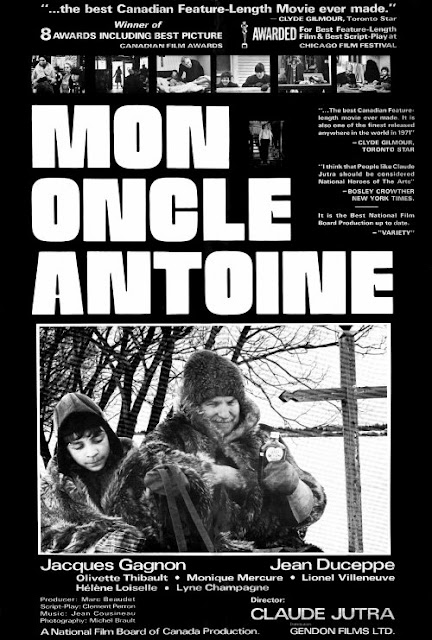Set in rural Quebec during the 1940s, Mon oncle Antoine is mostly the intimate character study of a teenager experiencing formative experiences over a Christmas holiday. Strongly evoking the work of François Truffaut (albeit without the master’s discipline or whimsy), Mon oncle Antoine explores several major themes simultaneously. Most effective is the coming-of-age material. Nearly as potent are scenes investigating the dynamics of a group that functions like a family. Least impactful, alas, are efforts at tethering this small story to a larger narrative about looming social change in French-speaking Canada. That said, one must admire the ambition of the piece, especially because the notion of world-class indigenous Canadian cinema barely existed at the time Mon oncle Antoine was made. (There’s a reason why this movie has for decades been prominent on lists of the best Canadian movies ever made.)
The picture gets off to an odd start, because cryptic early scenes depict the bleak life of Jos Poulin (Lionel Villeneuve), a French-speaking laborer. Then the movie awkwardly shifts from Jos’s remote milieu to the streets of a tiny town, where middle-aged Antoine (Jean Duceppe) operates a general store that doubles as a community hub. Antoine also serves as the local undertaker. Eventually, the filmmakers settle into the viewpoint of Antoine’s nephew, Benoit (Jacques Gagnon), who works in the store alongside Antoine’s wife, Cécile (Olivette Thibault); another teenager, Carmen (Lyne Champagne); and an adult clerk, Fernand (played by the film’s director, Claude Jutra). Antoine drinks, delegates, and vacillates between ignoring and seducing his wife, who seems a bit too receptive to Fernand’s flirtations. Meanwhile, Benoit endures the disorienting phase of learning how to critically appraise grownups—and how to manage growing awareness of Carmen’s sexuality. The main narrative begins about halfway through the movie, when Antoine gets the call to collect a body from a home in the countryside. Benoit tags along, but the journey becomes a test that everyone involved fails.
Notwithstanding a few moments of levity, Mon oncle Antoine is largely clinical and downbeat. Through Antoine’s eyes, we see how some lives fall into downward spirals, how other lives get stuck in empty routines, and how still more lives encompass only disappointment and regret. Left to the audience’s imagination, of course, is how Antoine might respond to these lessons. Co-written and directed by Jutra, a major pioneer in Canadian narrative film, Mon oncle Antoine boasts engrossing location work and persuasively naturalistic performances. Events feel authentic, as well, perhaps because the storyline was inspired by the youthful experiences of co-writer Clément Perron. Whether it’s accurate to call their film uniquely Canadian is best left to those born in the Great White North, but beyond dispute is the assertion that Mon oncle Antoine is thoroughly empathetic—perhaps to a fault. One can’t help but wonder how a more surgical edit of the same footage might have come across.
Mon oncle Antoine: GROOVY

